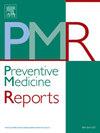伊利诺斯州芝加哥市糖尿病前期患者接受糖尿病预防支持的偏好及影响健康饮食和身体活动的因素
IF 2.4
3区 医学
Q2 PUBLIC, ENVIRONMENTAL & OCCUPATIONAL HEALTH
引用次数: 0
摘要
目的:对糖尿病前期患者推荐促进健康饮食和身体活动的生活方式干预。然而,低收入和少数族裔群体的个人往往得不到这些项目的充分服务。因此,本研究旨在研究患者对提供糖尿病预防支持的偏好以及影响患者健康饮食和身体活动的因素。方法本定性研究的数据收集于2023年1月至2023年5月。对伊利诺伊州芝加哥市一家城市急诊科筛查出的35例糖尿病前期患者(血红蛋白A1c: 5.7 ~ 6.4%)进行了半结构化访谈。急诊科主要为不同种族和民族的患者提供服务,特别是低收入患者。主题是用归纳和演绎两种方法生成的。初始代码以行为改变的能力、机会和动机模型和理论领域框架为指导。结果大多数患者(85.7%)对糖尿病预防支持感兴趣,并倾向于有一定互动的基于文本的传递。患者意识到(84%)糖尿病可以延迟甚至预防,但对糖尿病前期及其管理的知识有限。总体而言,患者积极参与生活方式的改变;然而,经历粮食不安全或生活在不支持环境中的个人遇到了独特的障碍。结论:这些发现强调了糖尿病预防支持(如项目、服务)可以根据患者的偏好和基本需求进行调整。采取这样的行动可能会加强糖尿病高风险群体的吸收和参与,这些群体通常可能得不到这样的支持。本文章由计算机程序翻译,如有差异,请以英文原文为准。
Preferences for receiving diabetes prevention support and factors influencing healthy eating and physical activity and among patients with prediabetes in Chicago, Illinois
Objective
Lifestyle interventions that promote healthful eating and physical activity are recommended for individuals with prediabetes. However, individuals with low-income and racial and ethnic minority groups tend to be underserved by these programs. Therefore, this study aimed to examine patient preferences for delivery of diabetes prevention support and factors influencing healthful eating and physical activity in this sample of patients.
Methods
Data from this qualitative study were collected from January 2023 through May 2023. Semi-structured interviews were conducted with 35 patients with prediabetes (hemoglobin A1c: 5.7 to 6.4 %) detected from screening in an urban emergency department in Chicago, Illinois. The emergency department primarily serves a racially and ethnically diverse patient population, especially individuals with low income. Themes were generated using both inductive and deductive methods. Initial codes were guided by the Capability, Opportunity, and Motivation Model for Behavior Change and Theoretical Domains Framework.
Results
Most patients (85.7 %) were interested in diabetes prevention support and preferred text-based delivery with some interaction. Patients were aware (84 %) that diabetes could be delayed or even prevented but had limited knowledge of prediabetes and its management. Overall, patients were highly motivated to engage in lifestyle change; however, individuals that experienced food insecurity or lived in unsupportive environments encountered unique barriers.
Conclusion
These findings highlight areas where diabetes prevention support (e.g., programs, services) can align their implementation with patient preferences and address basic needs. Taking such action might enhance uptake and engagement among groups at higher risk of diabetes who may not usually receive such support.
求助全文
通过发布文献求助,成功后即可免费获取论文全文。
去求助
来源期刊

Preventive Medicine Reports
Medicine-Public Health, Environmental and Occupational Health
CiteScore
3.90
自引率
0.00%
发文量
353
 求助内容:
求助内容: 应助结果提醒方式:
应助结果提醒方式:


